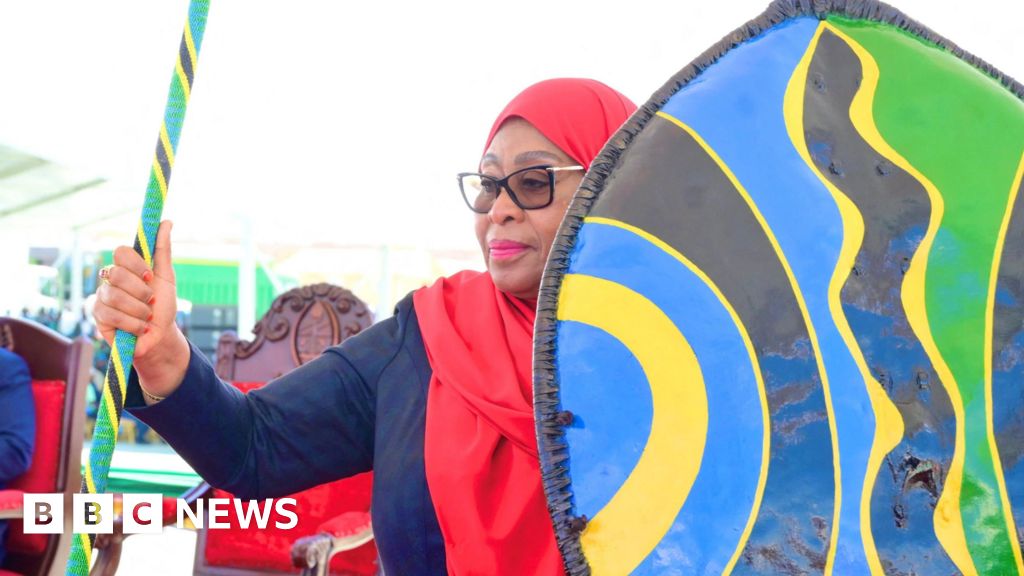Curfew lifted in Tanzania's main city after election unrest

Tanzania Lifts Curfew Amidst Lingering Unrest and Disputed Election Results
DAR ES SALAAM - Tanzanian authorities have lifted a night-time curfew in Dar es Salaam, the country’s largest city, nearly a week after it was imposed following deadly protests sparked by the recent general election. While some semblance of normalcy returns, the aftermath of the election, marred by allegations of widespread irregularities and violence, continues to cast a long shadow over the nation.
President Samia Suluhu Hassan was sworn in on Monday, securing a landslide victory with a reported 98% of the vote. However, the election's legitimacy has been challenged by opposition parties and international observers, with concerns mounting over reported casualties and restrictions on fundamental freedoms.
Resumption of Daily Life Tempered by Grief and Uncertainty
Following days of internet shutdowns and widespread closures, some shops in Dar es Salaam have reopened, and traffic has resumed. However, long queues persist at petrol stations, and families are grappling with the loss of loved ones allegedly killed in clashes between security forces and opposition supporters.
The main opposition party, Chadema, claims to have recorded at least 800 deaths during the unrest. While the United Nations human rights office reported credible accounts of at least 10 deaths in three cities, a diplomatic source in Tanzania has told the BBC there was credible evidence of at least 500 deaths. The Tanzanian government has yet to release official casualty figures.
Opposition Leader Missing, Concerns Grow
Adding to the tension, Chadema reports that its deputy chairman, John Heche, has gone missing after being taken from a police station in Dodoma on Tuesday morning. The party alleges that his family and a party official were told he was being taken to see the regional police commander, but the vehicles carrying him sped off, leaving them behind. Police have declined to comment on the matter.
“His whereabouts remain unknown, and his family and the party are deeply concerned about his safety and current location,” Chadema said in a statement.
International Observers Raise Concerns
Observers from the Southern African Development Community (SADC) have stated in a preliminary report that the election fell short of democratic standards. Key opposition figures, including Tundu Lissu, who is in detention on treason charges, and Luhaga Mpina, whose candidacy was rejected on technical grounds, were unable to participate in the poll.
Expert Analysis: A Step Backwards for Tanzanian Democracy?
Dr. Nicodemus Mushi, a political analyst at the University of Dar es Salaam, believes the recent events represent a worrying trend. "Tanzania had been making strides in democratic governance, but these elections and the subsequent crackdown on dissent suggest a significant setback," he stated. "The exclusion of key opposition figures and the reports of excessive force by security forces raise serious questions about the fairness and transparency of the electoral process."
Historical Context: Tanzania's Shifting Political Landscape
Tanzania has historically been regarded as a relatively stable nation in East Africa. However, under the late President John Magufuli, there was a noted shift towards authoritarianism, marked by restrictions on freedom of expression and assembly. While President Samia Suluhu Hassan initially signaled a more open approach upon assuming office in 2021, recent events suggest a return to more restrictive practices.
Professor Imani Msomi, a historian specializing in East African politics, highlights the broader regional context. "Across the continent, we are seeing a worrying trend of democratic backsliding. The events in Tanzania are part of this larger pattern, fueled by a combination of factors including weak institutions, economic pressures, and a growing intolerance for dissent," she explained. "It is crucial for regional bodies like the African Union to play a more active role in promoting and protecting democratic norms."
Allegations of Brutality and Cover-Ups
Reports from individuals on the ground paint a grim picture. A doctor at Muhimbili Hospital in Dar es Salaam, speaking anonymously for fear of reprisal, told the BBC that vehicles marked "Municipal Burial Services" have been collecting bodies at night, allegedly those of people killed during the protests, and taking them to unknown locations. Relatives are allegedly being denied the bodies, and survivors are reportedly being taken from emergency departments by the police before fully recovering.
Campaign groups such as Human Rights Watch (HRW) and Amnesty International have condemned the government's response to the protests. HRW has accused authorities of responding "with lethal force and other abuses," while Amnesty International expressed alarm at the use of excessive force.
Government Response and Future Outlook
The government has sought to downplay the scale of the violence, attributing it to foreign nationals and downplaying concerns over the election's integrity. During her inauguration, President Samia acknowledged the "loss of lives and destruction of public property" but maintained that it was "not surprising" that some of those arrested were foreign nationals.
With internet services slowly being restored and a curfew lifted, the immediate crisis may be subsiding. However, the underlying tensions and questions surrounding the election's legitimacy remain. The coming weeks and months will be crucial in determining whether Tanzania can address these concerns and restore faith in its democratic processes.
Originally sourced from: BBC News Africa
